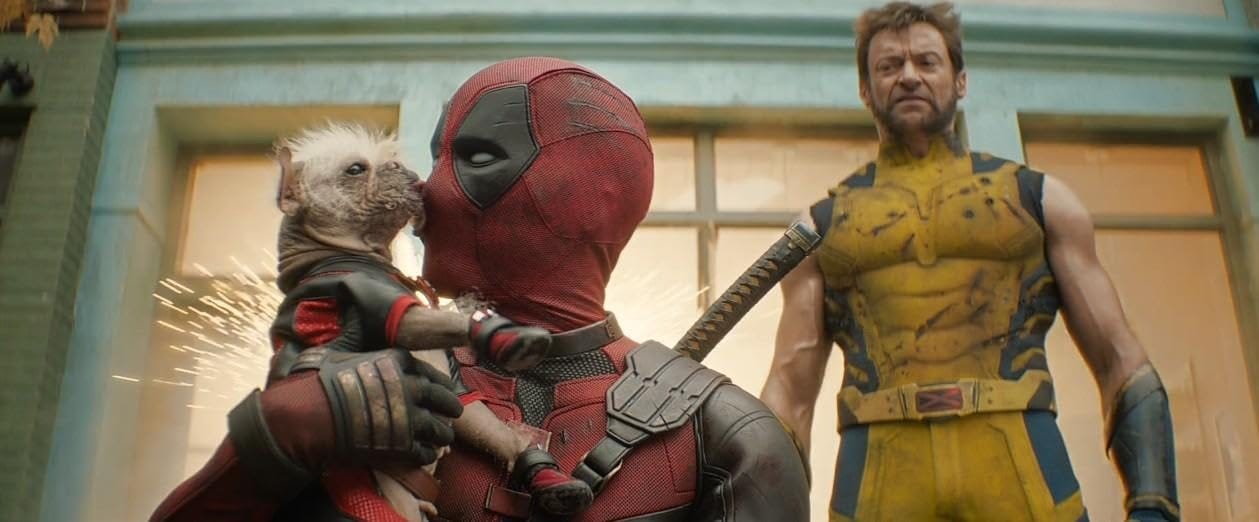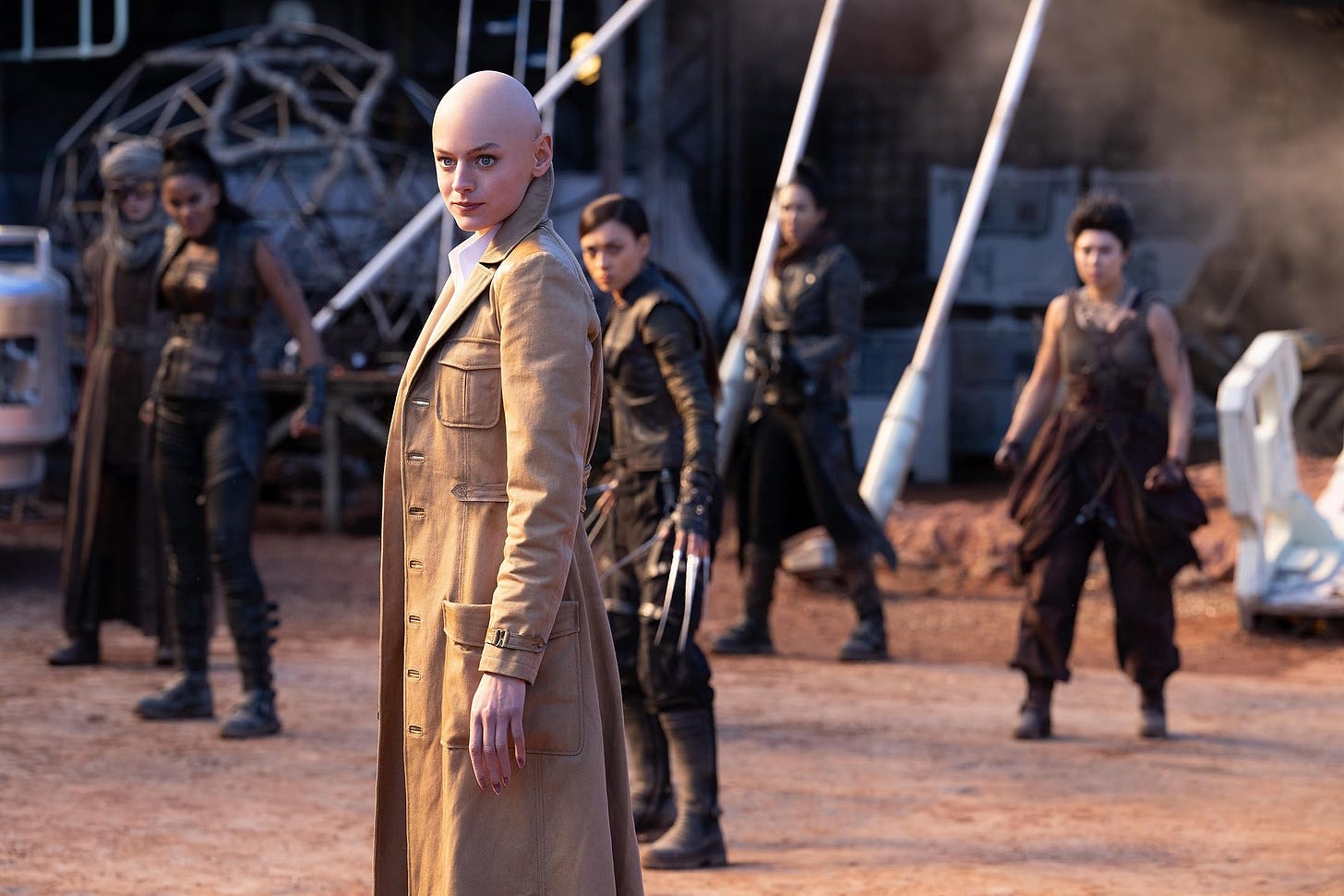‘Deadpool & Wolverine’ Review
Fear and self-loathing in las (multi)verse.

[Note: I have no idea how to write this review without discussing plot points or cameos, so if you’re worried about that sort of thing, please read this after you see the movie. My overall judgment is “If you like these movies, you’ll probably like this one,” though I’ll admit to occasionally feeling bludgeoned by it. I’m rating it fresh on Rotten Tomatoes; I hope that helps.]
AT A CERTAIN POINT IN THE PROCESS of viewing Deadpool & Wolverine, I started to really resent it. It’s not that it wasn’t funny in the same way the preceding films starring Deadpool (Ryan Reynolds) were: winkingly self-aware with numerous fourth-wall breaks; plenty of exaggeratedly grotesque violence; and a schoolboy’s penchant for clever profanity (or, at least, profanity that aspires to cleverness by jamming together disparate curse words and body parts and animals with a sex act picked at random … look, I won’t lie, it made me laugh).
The film—directed by Shawn Levy and written by (deep breath) Ryan Reynolds & Rhett Reese & Paul Wernick & Zeb Wells & Shawn Levy—accomplishes precisely what it sets out to do. All the aforementioned funny stuff—which gives Reynolds (whom I like!) the chance to flex his smarm (which I enjoy!)—sure, but also, you know, what’s promised in the title. Deadpool and Wolverine (Hugh Jackman) team up and become frenemies so they can have a grand adventure.
That grand adventure involves the Time Variance Authority, which longtime Marvel watchers will recognize as the multiversal agency in the Loki television series that involves keeping track of alternate timelines. The TVA, of course, has to be involved since Deadpool must journey into the multiverse to find a Wolverine to team up with since the Wolverine in his universe died in Logan. If all of this makes sense to you, good, Deadpool & Wolverine is the movie you’re expecting and will likely enjoy. If not, I’m not sure why you’re still reading.
Anyway, Mr. Paradox (Matthew Macfadyen) of the TVA has a big thingy that will make Deadpool’s universe go bye-bye, but Deadpool doesn’t want him to use the thingy, and to stop Deadpool from stopping the thingy, Mr. Paradox uses a fancy cattle prod to zap Deadpool and Wolverine to the Void. The Void is a point at the end of time that the TVA uses as a dumping ground for variants that must be removed from the timeline, and it is ruled by Cassandra Nova (Emma Corrin), an evil, female version of Charles Xavier (more or less; at the very least, she’s as bald as he is).

And the Void is where things start to get tricky, at least for me.
Because it’s here we realize that everything else in this film is window dressing. All the MCU lore, even teaming up Deadpool and Wolverine: that’s not why this film exists, not really. No, this film exists to serve as a 127-minute goodbye to the 20th Century Fox lineup of Marvel movies. But that distinction—the distinction between the Marvel movies created by 20th Century Fox and those that are part of Marvel/Disney’s MCU, which are both separate from the Spider-Man series of films made by Sony (except for when Marvel needs to borrow Spider-Man or Sony needs to borrow Dr. Strange)—only really hits home if you have, and I say this with due affection and the understanding that I am firmly in this cohort, wasted the last quarter-century of your life acquainting yourself with all the ins and outs and what-have-yous of these corporate behemoths.
Which is to say that we’re not just saying goodbye to 20th Century Fox’s X-Men and X-Men-adjacent characters like X-23 (Dafne Keen) and X-Men villains like Sabretooth (Tyler Mane) or Pyro (Aaron Stanford), all of whom have cameos here. We’re also saying goodbye to the Fantastic Four’s Johnny Storm (Chris Evans) and Daredevil’s Elektra (Jennifer Garner). But it goes even deeper than that. There’s an extended joke in this movie about a character who was long-rumored, who had a film in development for nearly a decade, who had a star excited to play him, and who never actually existed. It’s the sort of gag that only makes sense if you followed stories about the making of these movies very closely, if you grew up with a stack of Wizard magazines next to your bed.
The fact that I instantly understood this joke filled me with what I can only describe as a form of mild self-loathing. (It didn’t help that I actually laughed, because I actually found it funny, because the guy delivering the performance is actually perfectly suited for the stupid role in the first place. Damn his winning smile and shiny eyes!) The weirdest thing about Deadpool & Wolverine is that it manages to have its cake and eat it too: It cracks wise about Disney/Marvel and corporate shenanigans while its stars do battle next to the destroyed logo of 20th Century Fox while also closing with a montage during the credits that pays tribute to a quarter century of 20th Century Fox movies set to the most mawkish pop song you can imagine. Seriously, guess “mawkish montage song aimed to activate feelings in dudes from the millennial cohort” and you’ll probably get it, hell, you probably heard it at a school dance or ten if you were in school after about 1997.
I apologize for making this all about my own insecurities; thank you for sitting in on my therapy session. Deadpool & Wolverine succeeds at what it sets out to do. Reynolds and Jackman are precisely who they need to be for this movie to work, though the gags about Jackman doing this until he’s 90 feel more like a threat than a good-humored gibe. It made me laugh, though the mouthy merc’s self-aware shtick is wearing thin. It delivered a eulogy for an entire superhero universe in a genuinely heartfelt sort of way, though one that undercuts the above-it-all vibe this series has cultivated. But that very success left me with an oddly distinct discomfort.


